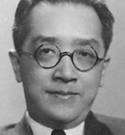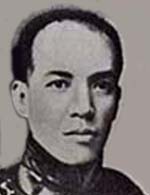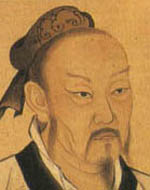Difficulties
Dating a Text
Hu Shr vs The WorldThe Dau/Dv Jing (DDJ) is a much loved book, and the question of its date is a correspondingly vexed question. In the Dauist text Jwangdz are many anecdotes of a meeting between Laudz (the supposed author of the DDJ) and Confucius. The point of those anecdotes is to demonstrate the superior insight of Laudz, and to reveal Confucius (and thus Confucianism) as shallow and misguided. The anecdotes may be dismissed (despite A C Graham, who was inclined to credit them) as mere stones thrown in the ongoing Warring States argument between Dauism and Confucianism. The DDJ text itself contains no contemporary references, and no proper names at all; it is almost as thought it had been wiped for fingerprints. With nothing available in these categories, much depends on assessing the book's style of thought, and placing it in its thought context. Concerning this, there may be differences, but there may also be a way to resolve the differences.
With this methodological issue in mind, here is a fragment of the DDJ debate, as carried on in 1933 between three the eminent scholars Hu Shr, Gu Jye-gang, and Lyang Chi-chau. Fvng You-lan was also attacked; his style criteria are, as Hu says, circular. For the others, we rely on Hu Shr's summary, published in HJAS 2 (1937) 373-397 as "A Criticism of Some Recent Methods Used in Dating Lao Tzu."
Gu had noticed that the DDJ used a word, gung
, not in its old institutional sense ("Prince"), but in a derived moral sense "public, fair"), and that instances of this usage tended to be late in Warring States texts. His examples of the moral sense included the Lw-shr Chun/Chou and the Sywndz, both from approximately the middle of the 03c. To this argument Hu retorted:
However, in the Analects the word gung is actually used in the moral sense: "By his generosity, he won all. By his sincerity, he made the people repose trust in him. By his earnest activity, his achievements were great. By his justice (gung), all were delighted (Analects 20)." If we deduct three hundred years from the Laudz because it employs the word gung in this sense, we should do the same to the Analects because the word is found there in the same sense. In that case, we should in turn relegate the Analects to the age of Sywn Ching and Lw Bu-wei (385f).This is no doubt a very telling debating point. Confucius on a par with Sywn Ching and Lw Bu-wei, indeed! The ancient sage bracketed with two hopelessly late figures, forsooth! Had Hu Shr been less intent on making this debating point, however, his critical faculty might easily have picked up the following details: (a) The Analects gung usage occurs in LY 20, the last chapter in the book. (b) Tswei Shu, whose long neglected works Hu Shr had himself helped to rediscover and republicize a decade earlier, had convincingly shown that LY 16-20 are in many respects aberrant within the Analects as a whole, and thus probably later. This aberrant stretch of course includes the LY 20 passage on which Hu here relies. It strongly suggests a date for the LY 20 passage that is later than the remainder of the Analects. (c) To take the date question beyond the point at which Tswei Shu left it, there are, in this late stretch of the Analects, several echoes of ideas often associated with Mencius and Sywndz. For example, LY 19 as a whole is constructed around a group of five disciples who otherwise appear as a group only in Sywndz. (d) To these hints that the date of the Tswei Shu layer is the first half of the 03c, Gu Jye-gang's datum about gung simply adds one more hint.
The way was now open for Hu to (e) complete Tswei's discovery by adding the missing (03c) date of Tswei's layer. Instead, he saw in this nugget only a rock to hurl at the head of a colleague. It was left for the authors of The Original Analects, sixty years later, to appreciate it at a truer value.
Round Two (Hu vs Lyang)
Next it is Lyang's turn. In Hu's sarcastic way of putting it, Lyang had . . .
. . . pointed out that Mencius seems to have had exclusive rights to couple the two words rvn and yi (benevolence and justice). But he forgot that in the Dzwo Jwan the words rvn and yi had been coupled more than once (as in the 22nd year of Jwang, and the 14th year of Syi). (386)We have here (a) the assertion that the coordinate compound rvn/yi occurs in the Dzwo Jwan, and (b) the assumption: that the date of a work must be the same as the date of the events or ideas it purports to describe. By the latter rule, Mr Hu himself, since here and in his other writings he treats of Warring States matters, can only be a citizen of the Warring States period. There may conceivably be a flaw in this reasoning. As for rvn/yi in the Dzwo Jwan, the cases cited by Hu are indeed the only two possible instances of that term in this gigantic text, and rather tenuous possibilities they are. We might take the time to look at them.
The Jwang 22 lines, in Legge's translation, are:
The superior man will say, 'In drinking there should be the complete observance of the rules, but not to carry it on to excess was righteousness [yi]. Completely to observe the rules with his prince, and then not to allow him to go to excess, was truly virtuous [rvn]' (103).The two terms occur not as a compound but separated, and in the order yi/rvn.
In Syi 14, Legge has the following:
In winter, there was a scarcity in Chin, which sent to Jin to beg to be allowed to buy grain. They refused in Jin, but [the Jin minister] Ching Jvng said, 'to make such a return for Chin's favor to us shows a want of relative feeling [wu chin]; to make our gain from the calamity of others shows a want of benevolence [bu-rvn]; to be greedy is inauspicious [bu-syang]; to cherish anger against our neighbors is unrighteous [bu-yi]. When we have lost these four virtues, how shall we preserve our state?" (162)Here the elements rvn and yi appear in what we may allow to be their Mencian order, but as two of four virtues, explicitly so called in the text, and all four virtues are cited in the negative. If we waive all that, if we banish the "four virtues" comment, and strip out the first and third clauses, and if then from the second and fourth we remove the unMencian negative, we still have no more than parallel predicates.
In other words, of the positive coordinate-noun compound rvn/yi there is not a trace in the Dzwo Jwan. The most we can say is that in two speeches out of thousands, the Dzwo Jwan uses rvn and yi as virtue terms among others, as part of a family of parallel clauses, and in no constant order.
Even this much establishes a certain commonality of discourse, though not an identity of statement, between Mencius and the Dzwo Jwan. There seems to be a shared pool of virtue terms, out of which the Dzwo Jwan takes an occasional handful including rvn and yi in some order, and out of which the Mencius fashions the signature compound rvn/yi. Does establishing this prove Hu's point?
- The majority opinion among critical scholars is that the final composition date of the Dzwo Jwan is toward the end of the 04c; our working date is c0312.
- D C Lau, following earlier scholars, has shown that once we correct the Shr Ji dates for the reigns of certain 04c kings, nothing in the career of Mencius needs to be dated to before 0320.
That is, the whole of Mencius's independent career falls in the late 04c, and it comes very close in time to the final completion date for the Dzwo Jwan. Hu's citations are thus compatible with the idea that the Dzwo Jwan and the historical Mencius occupied somewhat the same period, within the the larger stream of political theory discourse. That Mencius should develop a characteristic way of expressing himself, within that commonality of discourse, is not to be wondered at.
Evaluation
There is, in fact, nothing at all in the present investigation that is to be wondered at. Hu's point has vanished once we attribute the texts he cites to the times in which they were most likely composed, and not to the times which they purport to represent or describe. The presence of rvn and yi in the same pool of citable virtues thus proves to be, not a Spring and Autumn fact, but a late 04c fact. Of that fact, a faint echo may be detected in the Dzwo Jwan (an archaizing text of the period), and a more developed cliché may be found in the Mencius (in which the preserved interviews constitute a sort of direct advocacy text). Similarly, gung in its moral rather than institutional sense is not a Confucius usage, it is a late Analects usage. That the institutional usage should precede the moral usage; that a term for a ruler should later come to mean a quality asserted as proper to a ruler, is not itself implausible. To take a third and famous example, that the social class sense of jywndz "gentleman" should precede the moral sense of the qualities proper to a member of the ruling group, as Legge noted in what for us is the middle of the Analects, is not implausible either. Nor, in sum, is it implausible that the status terms of an obsolescent society should survive as the value terms of its successor society.
Envoi
That development is not disputed by any of the three persons cited above; it is a question of where within that development one puts a given text. Hu, in the heat of the argument, overlooked things which he knew perfectly well (such as the findings of Tswei Shu), and which on a calmer day might have contributed to supporting Gu and Lyang, thus further clarifying their results, instead of raising a cloud of dust around them.
To paraphrase the methodological moral which we drew from this in The Original Analects (p197):
No critical scholar now believes in the 06c DDJ, but rejecting that opinion merely because it is now the current fashion to do so is not enough. What can students learn from this episode, that will protect them methodologically against the next fashion? First, that reason will not always triumph in a contest with something else. Hu and others delayed the acceptance of the 03c DDJ by 60 years. We dislike this implication, but it would be wrong not to note it. Second, that scholars are not divided into Column A and Column B. Anybody, including so justly eminent a person as Hu, can make a mistake. And the converse: anybody, even a sincere beginner, can sometimes get things right. Third, that when you find yourself, in the middle of an argument, rejecting the idea that evidence leads to conclusions, you too are possibly making a mistake.One way to reduce the number of mistakes is not to forget, while working on the date of some text on Tuesday, what you found out on Monday about the date of some other text. Dating is not done in a vacuum. It is done in a fluid context where every conclusion affects every other conclusion, and where all the conclusions together have to make coherent and consistent sense.
Putting the stop date of the DDJ in the 03c, it will now appear, is the way to contribute to, and extend, that coherence and consistency.
27 Feb 2004 / Contact The Project / Exit to History Page


